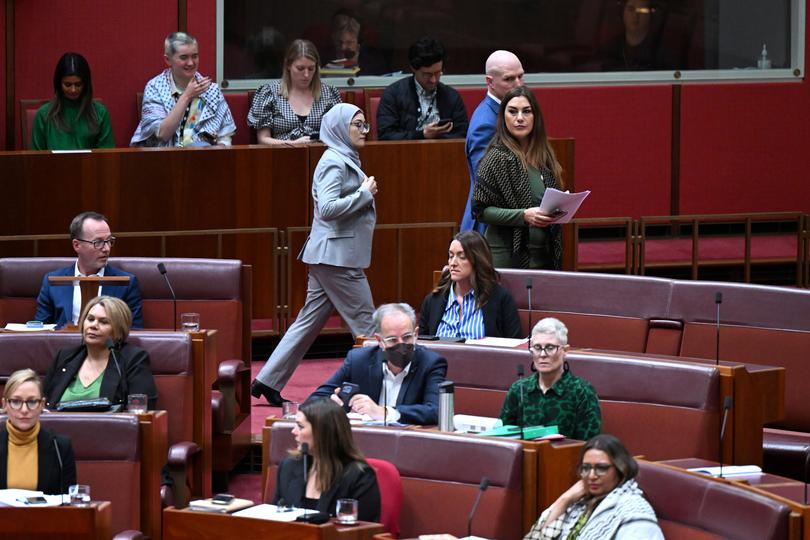KATE EMERY: Pollies and voters see different things when they look at Fatima Payman — and that’s a problem
KATE EMERY: When politicians look at Fatima Payman they see something different to what many voters do.

When politicians look at Fatima Payman, they see something different to what some voters do.
If Federal Labor can’t see that, they are in more trouble than Joe Biden.
The rage in the ALP at what they see as Senator Payman’s betrayal stems in part from the fact she was elected less on her own merits than by her Labor status, only to flout its guiding principle of caucus unity.
Sign up to The Nightly's newsletters.
Get the first look at the digital newspaper, curated daily stories and breaking headlines delivered to your inbox.
By continuing you agree to our Terms and Privacy Policy.It’s a bit like paying for your date’s dinner, only to have them go home with the person at the next table.
But the average voter, who may or may not know what a caucus is, likely doesn’t see that. Regardless of whether they agree with Senator Payman’s position on Palestine, what those voters might see is not a fledgling senator whose fingerprints are on the knife protruding from Prime Minister Anthony Albanese’s posterior, but a conviction politician.
And plenty of people, particularly younger voters and those who feel disenfranchised from mainstream politics, are attracted to the idea of a politician who acts on principle. It’s just a whole lot sexier than an elected member who argues their case in the party room, works behind closed doors to shift the dial and votes in line with the party even when they disagree with it and everyone knows it. Sorry, Penny.
It’s a problem to which both major parties, but particularly Labor, should be paying attention, doubly so after the weekend’s Newspoll figures show a further drift from both Federal Labor and the Coalition. Reminder: nearly one in three Australians voted for minor parties or independents in 2022.

This is not a column defending or condemning the horrific nature of the war in Gaza — if there’s anything I’m less qualified to do it probably involves open heart surgery. Nor am I defending or condemning Labor’s practice of caucus solidarity.
But the reality is that, with a more diverse Parliament than ever before, Senator Payman’s decision to cross the floor on Palestine might be the start of something — not a one-off blip.
More diversity in Parliament means more politicians with a diversity of views and experiences that will inevitably inform their position on political issues. This is, just in case anyone thinks I’m over here cross-stitching a swastika to my sleeve, an excellent thing: Parliament should reflect Australian society and Australian society isn’t just a bunch of white guys.
Political parties love diversity when it looks good on paper and plays well with the electorate. They may not be quite so keen when diversity chafes against discipline.
Having suspended Senator Payman from caucus, Mr Albanese clearly resented the distraction from the good-news story of tax cuts.
That distraction became not so much the elephant in the room as the herd by Monday afternoon when Senator Payman signalled she would be “reflect(ing) on my future” after being “exiled” from the party. “I will abstain from voting on Senate matters for the remainder of the week unless a matter of conscience arises where I’ll uphold the true value and principles of the Labor Party,” she said in a statement.
Sociologist Andrew Jakubowicz, of the University of Technology Sydney, has been around long enough to know politicians have been crossing the floor for as long as there’s been a floor to cross. But, in the context of the fracturing of Australia’s political landscape, he suggested it wasn’t always a bad thing.
He reckons that, if more party politicians Do A Payman (my choice of words, not his) it could help voters re-engage with mainstream politics, rather than the opposite, because they see it not as an act of betrayal or party disunity but as a sign that the politicians they helped to elect are listening to them.
Senator Payman may or may not survive the term (or the week) as a Labor politician. But both sides of politics should be paying attention to what she represents if they care about their own long-term survival.
